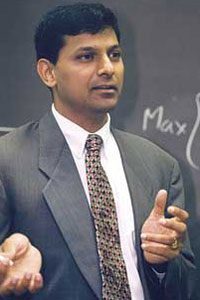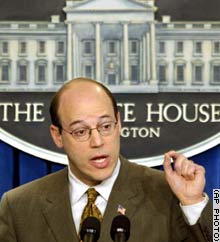Archive: January 2006
Anonym.OS
January 28, 2006
A friend, who shall remain nameless, has recently moved to a country, which shall also remain nameless (I'll only say that it used to be part of the former Soviet Union). One of the issues that the people of this country (and now my friend) are dealing with are this country's draconian controls over email and internet (no, for the record, he has really not moved to the United States).
Slashdot (Motto: "News for Nerds. Stuff that Matters.") has a recent post that may help to solve my friend's problems. According to the Slashdot post, privacy experts have created a bootable CD based on OpenBSD (a free Unix- or GNU/Linux-like operating system) that is carefully constructed to allow users to surf anonymously from any computer anywhere. The CD maintains the users anonymity on the internet by dividing all communications into small packets, encrypting them, and sending them back and forth in separate pieces via the Tor dedicated network of "onion routers", which ensures anonymity.
The main problem, apparently, is that the service is slow. Between all the encryption and the limited number of servers around the world, Anonym.OS is not well-suited for downloading mp3s or sending digital photos. But it sounds like it has real promise for lower-bandwidth surfing and accessing webmail applications.
Wired has a story with some more details. You can download the "live CD" at SourceForge.net. And just to avoid misunderstandings, a "live CD" doesn't mean that they recorded it in front of an audience. It means that if you put the CD into your CD drive and reboot the computer, the CD itself will provide a complete operating system, bypassing the operating system installed on your machine. (One especially nice trick built into the Anonym.OS CD is that the CD camouflages itself. The outside world thinks you're running Windows XP Professional.)
I haven't experimented with the CD yet, but I plan to. If you're a friend of mine and want a copy, send me an email, and I'll put a CD in the mail to you.
African-American workers and automanufacturing
January 28, 2006
Early on Monday morning, just after the word was out that Ford would be announcing massive layoffs later that day, we made a quick decision at CEPR to rush-release a series of tables and graphs we had prepared a few weeks earlier on trends in African-American employment in manufacturing in general and automanufacturing in particular.
You can read the entire (brief) report [pdf] on the CEPR web page, but here are a few highlights. Back in 1979, just over two percent of black workers in the United States --one in every 50 black workers in the country-- worked in the auto industry. By 2004, the figure had fallen to just over one percent. By contrast, in 1979, about 1.3 percent of white workers were in auto manufacturing, a share that fell to 1.1 percent by 2004. The decline in automanufacturing --which pays high wages and generally provides excellent health, pension, and other benefits-- has hit African-Americans harder than whites.
The data also show that African Americans are no longer over-represented in manufacturing more broadly. From at least the end of World War II through about 2000 (we only analyzed data from 1979 on), African American workers made up a larger share of the manufacturing workforce than they did of the overall workforce. As with whites, manufacturing, especially unionized manufacturing, was the way many black families broke into the middle class. From the mid-1990s on, however, African Americans have been under-represented in manufacturing, with big implications for the black middle-class.
On a personal note, I was very happy to be able to discuss the report on New York City's WBAI radio station. On Wednesday morning at 8:20am, I did a 10-minute interview for WBAI's "Wakeup Call". You can listen to an MP3 version of the whole hour here. If you're only interested in hearing me, I come on at about minute 23 and exit about minute 35. When I was in my late teens and early 20s, living in the shadow of NYC, I always thought WBAI was about as cool as it got. Now I guess I'm living the dream.
Unions Hold their Own in 2005
January 22, 2006
I forgot to mention that last Friday my employer, the CEPR, released a one-page analysis, written by Ben Zipperer and me, of the government's latest annual report on "Union Members" in the United States.
Given all the bad news for the labor movement in 2005, last year was shaping up to look pretty bad for labor. As it turned out, union membership held its own as a share of the workforce (12.5 percent).
Ben and I caution against making too much of a single break in a long pattern of decline. Union membership rates, for example, held steady between 1998 and 1999, and again between 2000 and 2001, but the long-term deterioration continued.
One interesting feature of this year's numbers is that for the first time in the history of the US labor movement, workers in manufacturing are no longer more likely to be covered by a union contract than are workers outside of manufacturing (both are 13.7 percent). (Some workers are not members of the union where they work, but are represented by the union for purposes of collective bargaining. The government, therefore, keeps separate track of union members and workers covered by union contracts.)
You can read the full Bureau of Labor Statistics report here; and our brief analysis, here. Agence France Presse also ran a story that cited our report.
IMF and ECB
January 21, 2006

Speaking of the IMF, what's going on over there? First thing, the staff is engaged in "industrial action" to protest pay and benefit cuts (see below). Next thing, the organization's chief economist is telling the European Central Bank not to raise interest rates too quickly. Yes, that's correct, not to raise rates.
The IMF's chief economist, Raghuram Rajan, made the remarks in an interview with Reuter's in India on Thursday, January 19. While Rajan's assessment of the world economic situation was generally upbeat, he warned that "The European recovery is still not in the bag".
He also expressed concern about a slowdown in the US housing market and about the willingness of foreign investors to continue to finance the US current account deficit.
If Rajan gets the axe over at the IMF, we may have to hire him at CEPR.
IMF and Solidarity
January 21, 2006
According to a Reuter's report earlier this week, hundreds of IMF employees staged a protest on January 17 in the marble gallery of the organization's headquarters in Washington. The IMF staffers were objecting to new IMF personnel policies that would, among other things, increase internal pay disparities, reduce reimbursement for private education of dependents, and shift "home-leave" air travel from business to economy class.
As I've noted elsewhere, the IMF has recently taken to recommending much more draconian labor-market reforms around the world than what the organization is trying to push on its own staff. Maybe these same IMF staffers will think twice before ordering the next IMF member country to cut public-sector budgets or "reform" away basic labor-market protections.
Celebrity Sightings: BETTY
January 17, 2006

Within the space of about ten days, I've managed to sight all three of the front-women from BETTY, the New-York-based alternative rock band that my brother and I used to watch when they called themselves On Beyond Zebra in Washington, DC, back in the mid-1980s.
BETTY is in town performing a second run of their rock opera BETTY Rules at the Washington, DC, Jewish Community Center. My brother and I caught the first run there last fall, and it was really outstanding. The show is an autobiography of the band from the early days when suburban-DC sisters Amy Ziff and Elizabeth Ziff first hooked up with the breath-taking Alyson Palmer. (The truth be told, I fell in love with the band the first time I saw Alyson tending bar at the old 9:30 Club --before I'd even heard them perform.) But, its not just all the energy, sexual and otherwise. They can sing, they can play, and they put on a tremendous show.
For the record, I spotted Alyson Palmer, with an entourage that included her daughter (with fellow band member Tony Salvatore), at Hank's Oyster Bar at 17th and Q Streets, NW, two Fridays ago. About a week later, I saw Amy Ziff at Teaism at Connecticut and R, NW. The next day, I saw Elizabeth Ziff and Amy, together, this time at the Cosi at Connecticut and R, NW.
"BETTY Rules" is running at the DC JCC until January 29, so there is still time to catch the show; and probably still time to sight band members in the Dupont Circle area. At something over six-feet tall, Alyson is particularly hard to miss.
New paper on unemployment in Europe
January 16, 2006
Andrew Glyn, David Howell, and I have a new paper disputing the standard interpretation of high unemployment in some European countries. The paper, called "Labor Market Reforms and Unemployment: Does the Evidence Tell an Orthodox Tale", will appear in the March-April edition of Challenge magazine, but you can read a working paper version here [pdf].
The standard story is that generous social welfare systems, including a central political and economic role for unions, are the root of high unemployment rates in much of Europe. Never mind that Sweden, Denmark, and The Netherlands all have massive welfare states, powerful unions, and unemployment rates comparable to or even lower than the United States. Never mind that Germany consistently outperformed the US for decades with the same social-welfare system and labor-market institutions that are suddenly supposed to be the cause of its current woes. Never mind that Spain has one of the most underdeveloped welfare states in Europe and still has the highest unemployment rate on the continent.
We're not saying that Europe, as a whole, doesn't have an unemployment problem. We're just saying it doesn't make much sense to blame European welfare states or unions.
Ask AriScott
January 7, 2006

AriScott, does the President feel comfortable about giving a future president in the mold of Bill Clinton the legal right to conduct surveillance of US citizens without a warrant?
AriScott, what actions has the President taken to ensure that gun owners in the United States will not fall into the net cast by the National Security Administration's domestic spying program?
AriScott, what assurances can the President give to gun owners that a future president in the mold of Bill Clinton would not use the NSA's domestic spying program to target them as a group?
BGHS Data
January 6, 2006
I've just posted the data set that various permutations of Dean Baker, Andrew Glyn, David Howell and I have used in several recent papers looking at unemployment in Europe, including this one for the International Labor Office at the end of 2003. The data won't be of much interest to most people, but, sadly, I think I get more requests for this dataset than anything else I've ever done. A brief description, and links to the zipped file, are here.
How to Recycle Old Computer Equipment
January 5, 2006

If you're wondering what to do with your old and beaten computer equipment, the kind of stuff that is essentially a useless pile of plastic and heavy metals, I stumbled across one option at my local Starbucks (which one, you ask, all of them, I think). Hewlett Packard (HP) offers a service where for a relatively small fee, they'll come by your house and pick up computer and computer-related hardware, and it doesn't even have to be HP equipment.
You can get all the details here. To get an idea of the cost, I used their estimator to price pickup on an inkjet printer, a PC with monitor, a PDA, and an old router. The total came to $98, which seems like a bargain for the environment. (Imagine if we added a small recycling fee to the upfront cost of computers and other electronic gear and then used the fee to fund a public or private recycling effort along these lines? Maybe even overcharge on the upfront fee and offer a small rebate for each item turned in? Probably smacks too much of socialism, but one can dream.)
Your local government may have a free service, funded out of taxes, so its worth checking there first. In addition, the National Safety Council maintains an Electronic Equipment Recyclers Contact List, with recycling information for each of the 51 states.
Joining the technorati
January 3, 2006

I've decided to join the technorati. You might think that I was already a member, but this has to do with registering my blog at www.technorati.com. My primary motivation is curiousity. A secondary issue is that it might increase traffic to my page (it would be hard not to increase traffic to my page; Mom, I think the tea kettle is boiling!). You can read my Technorati Profile here. There's nothing to read there except my name and the date I joined the technorati, but including this link somehow allows me to "claim my blog" in Technorati-speak. I'll let you know if Technorati has any impact on visits to the site.
The Danish Model
January 2, 2006

(Via NAM reader DH) The latest issue of Newsweek (international edition) has a surprisingly favorable piece on the Danish economic model.
Newsweek notes that Denmark enjoys low unemployment (4.8 percent in the third quarter of 2005, compared to 5.0 percent in the United States, according to the Organization for Economic Cooperation and Development (OECD) [pdf]) and relatively rapid economic growth (a projected increase in real gross domestic product in 2005 of 3.0 percent, compared to 3.6 percent for the United States, according to the OECD [xls]). Denmark also does extremely well on a host of other indicators, including one of the lowest poverty rates in Europe (which Newsweek mentions), and essentially complete health-care coverage and high employment rates (which Newsweek doesn't mention). (For a nice discussion of the Danish model, see the paper [pdf] by Peter Plougmann and Per Kongshøj Madsen available from the New School's Schwartz Center for Economic Policy Analysis.)
The "model" works despite --I would say largely as a result of-- what most economists and politicians in the United States would see as two serious strikes against it. Strike one: Denmark has the second highest share of taxes in GDP among the 30 rich (and some not-so-rich) countries in the OECD. According to OECD data, in 2004, totaled 49.6 percent of Danish GDP, up from 48.3 percent in 2003. By comparison, taxes amounted to only about 25 percent of GDP in the United States in the same two years. Strike two: As Newsweek points out, Denmark also has a remarkably high 82 percent of its workers represented by unions. Union representation in the United States is about 14 percent and falling.
The Newsweek article correctly identifies some of the key reasons for success. Probably most importantly, the Danish model delivers a "delicate Danish balance of flexibility and security". The combination of universal health care, paid sick leave, paid family and medical leave, generous unemployment benefits, and an almost completely public pension system gives workers the kind of security they need to accept the levels of flexibilty that employers think is important. Workers in the United States would certainly be more open to expanded trade, for example, if they thought that they could actually support their families on unemployment benefits while they retrained for new jobs or that they would have good health insurance and a decent pension guaranteed by the government, independent of where they ended up working.
But, Newsweek fails to make the explicit connection back to high taxes and high unionization rates. High taxes support the generous social benefits that make the flexibility politically possible. Almost universal unionization rates make employer-employee cooperation and coordination possible.
To its credit, the piece also repeatedly emphasizes several crucial points not made often enough in journalistic discussions of "economic models". First, economic models come and go. In the 1980s, Japan was the rage. In the early 1990s, pre-unification Germany was very popular. Since then, the United States has been the almost universal reference point (amazing, of course, to almost anyone who has lived here since 2000, but true). Second, economic models tend to be pretty difficult to "export" since they usually reflect idiosyncracies of national history and the outcome of decades of negotiations between employers, workers, and governments. As an academic quoted in the piece says: "We did not produce this model based on a master plan". Or in the words of one Danish CEO: "We don't think [consciously] about the Danish model because there is no alternative". Finally, economic models are hard to pin down because they are almost always in flux, with dynamic tensions causing them to evolve and occasionally even to break down. In the words of that Danish academic: "it might derail quite easily".
What would be really nice would be to see this kind of reasoning introduced into stories in Newsweek and elswhere about the "US model", especially when US-style deregulation is being urged on European economies. Don't rush to copy the United States. By the time you do, we may well be on to the next "it" economy. And copying US-style labor relations might be socially or politically impossible. Imagine the public reaction to eliminating statutory vacation in France or Germany, or to putting something like two percent of working-age men in prison.
The Best of 2005: NYC's Transit Workers
January 1, 2006
Annette Bernhardt, of the Brennan Center for Justice at the NYU School of Law and Chitra Aiyar have written an excellent brief analysis of the recently concluded transit workers' strike in New York City. Bernhardt and Aiyar declare the MTA transit workers the "Best of 2005" and make a strong case for their decision.
You'd never know it from the national media attention, but after walking off the job, the striking workers actually managed to win most of their demands, which centered around resisting long-term benefit cuts for future MTA workers. "Yes," Bernhardt and Aiyar write, "the strike disrupted the city and cost businesses some of their holiday profits; but giving in to the MTA's demands would have cost working families far more in the long run. And yes, escalating benefit costs are very real issues that both the public and private sector need to deal with; but knee-jerk solutions aren't the way to address root systemic problems in how we provide for health care and retirement in this country."
Bernhardt and Aiyar conclude the key lesson of the MTA strike was that "...nothing is inevitable, change is always possible, and giving in to powerlessness is the greatest enemy of all." A great way to start the new year.